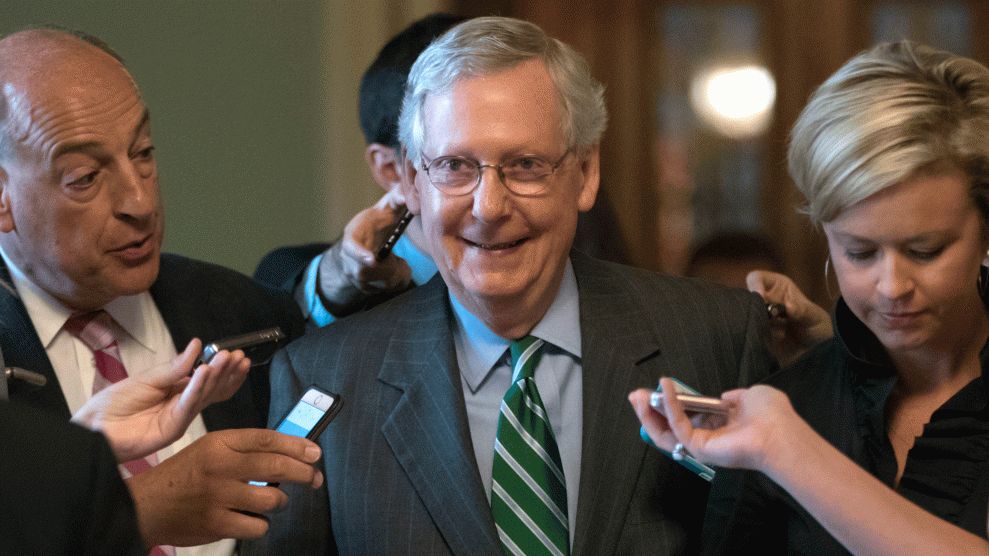
Senate Majority leader Mitch McConnell after announcing the release of the Republicans' healthcare billJ. Scott Applewhite/AP
On Thursday morning, Senate Republicans released their highly anticipated plan to repeal and replace Obamacare, titled the Better Care Reconciliation Act of 2017. The legislation quickly drew criticism from drug policy experts and politicians who worry that the bill cuts substance abuse and mental health services amidst a spiraling opioid epidemic. Drug overdoses killed 52,404 Americans in 2015 and roughly 60,000 Americans last year—more than car accidents or gun violence.
“I hope our Senators ask themselves—what will happen to the Americans grappling with opioid addiction who suddenly lose their coverage?” former President Barack Obama wrote in a Facebook post about the Senate bill.
Here are the basics about how the legislation would affect addiction services:
Provides “a joke” of substance abuse funding
As Senate Republicans were drafting the bill, two Republicans, Ohio’s Rob Portman and West Virginia’s Shelley Moore Capito, requested $45 billion over 10 years to address the opioid epidemic. But the Senate bill offers just $2 billion, in 2018 alone, for mental health and substance and treatment. The funding amounts to “a joke,” says Richard Frank, a Harvard health economics professor. Frank estimates that it would cost $183 billion over ten years to cover the cost of opioid addiction treatment and the illnesses that frequently come along with it (like hepatitis C and HIV) for those who would lose coverage if Obamacare is repealed. That number is based on Medicaid data showing that the typical Medicaid recipient with opioid use disorder costs between $11,000 and $12,000 per year.
Slashes Medicaid funding
Medicaid, which provides insurance coverage for more than 70 million Americans, is the largest payer for addiction services across the country. In some states hard hit by the opioid epidemic, like West Virginia and Ohio, Medicaid pays for more than 40 percent of the buprenorphine, a life-saving opioid addiction medication, consumed in the states.
Medicaid works as a matching program: the federal government matches state Medicaid spending to provide coverage to its poorest residents, with no limit on how much money the federal government will spend. The Senate bill would, for the first time, put a cap on how much money federal government grants states under Medicaid. There isn’t yet an analysis of exactly how much money this will cut from Medicaid, but when the House included a similar provision in the bill it passed last month, the Congressional Budget Office projected that it would cut Medicaid spending by $834 billion over the next decade.
Eliminating that funding would be particularly crippling for many of the communities that voted Trump into office, says Keith Humphreys, a Stanford University psychiatry professor who advised the Obama administration on drug policy. As he said this spring, “This will hurt the worst in the places that supported these politicians the most. They voted in this Congress that is now going to stick a knife in them.”
Repeals Medicaid expansion by 2025
One of the most significant parts of Obamacare was a provision expanding Medicaid to millions more poor Americans. Under the Affordable Care Act, people who earn up to 138 percent of the federal poverty level are eligible for this government-funded insurance program, provided they live in one of the 31 states that elected to expand the program. An additional 11 million Americans have gained insurance coverage through Medicaid expansion. The Senate bill would begin to phase out Medicaid expansion in 2021, with extra funding cut altogether in 2025.
Medicaid expansion has been a game changer for substance abuse treatment: In states that expanded, the proportion of people with substance abuse or mental health disorders who were hospitalized but not insured fell from 20 percent in 2013 to 5 percent in 2015.
Sunsets “essential” services in Medicaid expansion
Under Obamacare, insurers are required to offer so-called “essential health benefits,” including mental health and substance abuse services. In order to sell insurance, insurers have to cover addiction treatment, contraception, preventative care, and emergency services—here’s the full list. That set of guarantees also applies to how states must structure their Medicaid programs. In 2020, the Senate bill would end essential benefits for people covered under Medicaid expansion.
Critics worry this could would give states the option to not cover substance abuse treatment. The bill would “leave a lot of places to drop substance abuse coverage because it’s cheaper if you don’t take care of peoples’ addiction,” says Keith Humphreys, Stanford University psychiatry professor who advised the Obama administration on drug policy.
As Baltimore health commissioner Leana Wen said in a statement shortly after the bill’s release: “Insurers can stop providing coverage for mental health and addiction services. At a time of a public health emergency around opioid overdose, this will cost millions more lives.”













